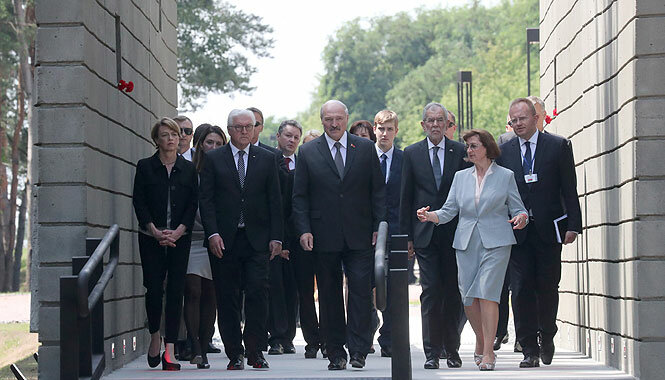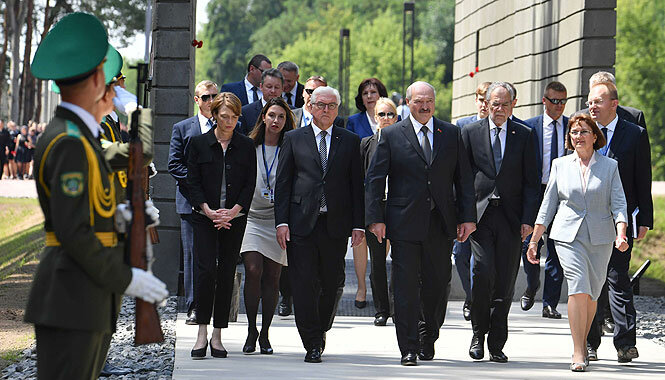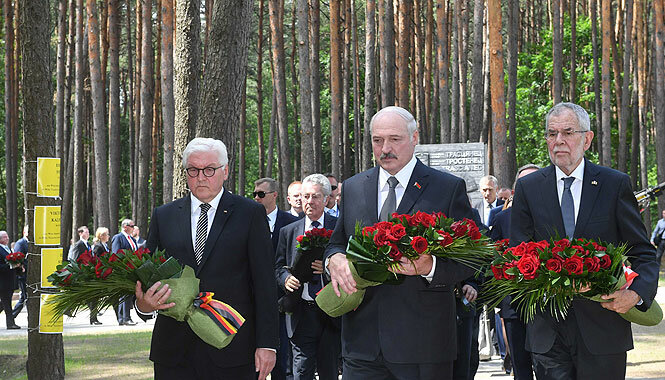Сeremony to pay tribute to the Nazi victims at the site of the former death camp Trostenets
- 17
- 7:21
The international community is facing ‘demons of intolerance’ again, Belarus President Aleksandr Lukashenko said at a ceremony to pay tribute to the Nazi victims at the site of the former death camp Trostenets on 29 June.
“Postwar order reinstated security and peace on the continent for many decades. It seemed that the humankind learned the common lessons of the Second World War. However, today we see that the past still has a firm grip on us. Many do not recognize state borders. The international community has come to face ‘demons of intolerance’ that foment hatred and provoke violence,” the head of state said.
Aleksandr Lukashenko called for launching a new large-scale international dialogue to overcome all the disagreements. “The lack of this dialogue is clearly felt in the current geopolitical relations,” he noted.
“It is only through trust, respect and an open honest conversation that we can strengthen international security, jointly confront hostility, hatred and bigotry and ensure a happy future for children,” the Belarusian leader said.
“Since we have a unique opportunity to know the truth about that war from the stories told by those, who experienced it firsthand, the most important thing we should do is to preserve this memory and prevent a revival of the dreadful past. History has demonstrated in no uncertain terms that one cannot ignore evil even if it is only a nascent idea. Its transformation into a real threat is only a matter of time,” stressed the Belarusian head of state.
“We represent different nations, different faiths. We live in different countries. Politicians and public figures, we stand here because we remember the tragic lessons of the common history. We know how human lives were devalued by the ideology of Nazism, which turned the world upside down with crimes unparalleled in their cruelty,” said Aleksandr Lukashenko.

In his words, death camps were the most incomprehensible phenomenon of World War Two. The new commemorative object in Blagovshchina has been erected at the site of one of the largest death camps. “Jews from Berlin, Bremen, Vienna, Dortmund, Prague, and other European cities were forced to walk the path of death here. Ashes of Belarusian civilians, underground resistance fighters and partisans, and Soviet POWs rest here, too,” noted the President. “Butchers driven by the antihuman Nazi idea were hell-bent on exterminating everyone, who didn’t fit their perverse concept of the new world order.”
The head of state noted that with this memorial Belarusian architects had managed to demonstrate the fine line between life and death, which separates living breathing human beings from a pile of ashes. He thanked the presidents, politicians, and public figures, who had turned up for the rally, as well as representatives of religious organizations, leaders and residents of European citizens, all the indifferent people, whose common efforts help memory about Trostenets death camp victims live on.
Aleksandr Lukashenko urged everyone to support the Belarusian initiative for creating a digital book of memory of Trostenets victims.
The head of state also remarked that participants of the event had been driven together by the painful memory of the dreadful events of World War Two. Aleksandr Lukashenko stressed that the unity of the participants of the requiem rally was the key symbol of the meeting.
Belarus President Aleksandr Lukashenko together with the presidents of Germany and Austria Frank-Walter Steinmeier and Alexander Van der Bellen visited the Trostenets Memorial Complex on 29 June where a requiem rally dedicated to the memory of Nazism victims took place.
On the way to the memorial graveyard Blagovshchina where the requiem rally took place the heads of state had to go past the architectural structures designed to look like the wagons, in which people were brought to the death camp during the war. One can see lit oil lamps and flowers in the windows of these wagons. The phonogram is composed of sounds of an oncoming train, voices of people speaking different languages, and children cries.

As part of his speech during the requiem rally the Belarusian head of state called for a moment of silence. The presidents of Germany and Austria, other visiting dignitaries spoke about the importance of remembering the lessons of history. An address by Poland President Andrzej Duda was read out.
The musical episode Minute of Memory and Sorrow was presented before participants of the requiem rally. It was designed to symbolize the memory about victims of the Nazi atrocities and appeal for preventing a repeat of that dreadful war. An ensemble of violinists recited poetry and performed music. White doves were released into the sky at the end of the ceremony and the president of Belarus and the visiting dignitaries laid flowers at the commemorative slab of the memorial graveyard Blagovshchina.
Trostenets was one of the largest death camps set up by the Nazi to eliminate civilians in 1941-1944. It was the fourth largest death camp after Auschwitz, Majdanek, and Treblinka in terms of the number of victims. Residents of Belarus, other USSR republics, deported citizens of Western European countries, including Austria, Germany, and Czechoslovakia, perished in this death camp. The official death toll exceeds over 200,000 people from various countries.
On 8 June 2014 Belarus President Aleksandr Lukashenko took part in the ceremony to place a time capsule at the site of the future Trostenets Memorial Complex. Aleksandr Lukashenko stressed that the Trostenets Memorial Complex should become a place of pan-European importance.
The memorial complex consists of several locations where the Nazi invaders slaughtered people during World War Two: the Trostenets death camp, the Shashkovka site (a pit crematorium), and the Blagovshchina site (34 mass graves).
The first stage of the complex and the memorial sculpture Gate of Memory were opened at the site of the former death camp on 22 June 2015. The memorial graveyard Blagovshchina was accomplished as part of the second stage of the Trostenets Memorial Complex. A ceremony to bury remains of Nazism victims, which had been found in the course of construction work, was arranged there on 25 June 2018.


































